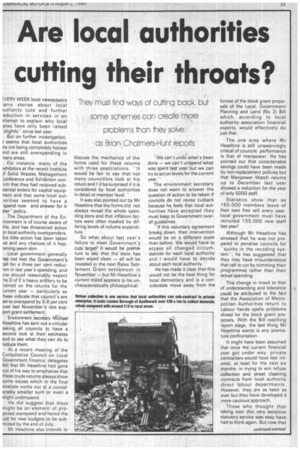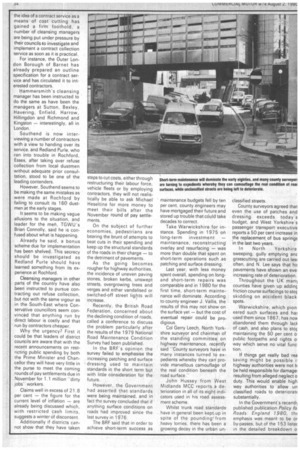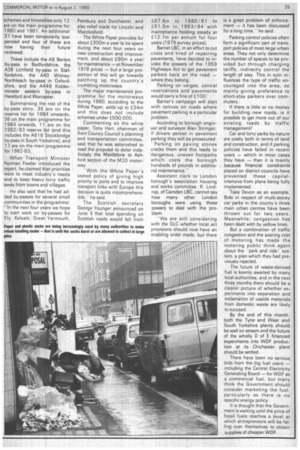;tie local authorities cutting their throats?
Page 35

Page 36

Page 37

If you've noticed an error in this article please click here to report it so we can fix it.
They must find ways of cuttind back, but some schemes can create more problems than ey solve. as Brian Chalmers-Hunt reports
:VERY WEEK local newspapers :arry stories about local wthority cuts and further 'eduction in services in an ntempt to explain why local 'ates have only been raised 'slightly" since last year.
But on further investigation, t seems that local authorities ire not being completely honest Ind are still overspending in nany areas.
For instance, many of the !xhibitors at the recent Institute )f Solid Wastes Management 3onference and Exhibition conirrn that they had received sub;tantial orders for capital equipnent and that some local autlorities seemed to have a 'spend now and answer for it ate(' policy.
The Department of the Entironment is of course aware of his, and has threatened action )n local authority overspenders. 3ut little action has been taken (et and any chances of it hap)ening seem slim.
Local government generally las not met the Government's all for a three per cent reducion in last year's spending, and )ne should reasonably expect he D of E's heavy artillery to be rained on the returns for the :urrent year — particularly as :hese indicate that council's are set to overspend by 5.6 per cent over last November's rate support grant settlement.,
Environment secretary Michael Heseltine has sent out a circular asking all councils to have a second look at their estimates and to see what they can do to reduce them.
At a recent meeting of the Consultative Council on Local Government Finance delegates felt that Mr Heseltine had gone out of his way to emphasise that these crude returns always show some excess which in the final analysis works out at a considerably smaller sum or even a slight underspend.
He did suggest that there might be an element of pro iected overspend and hence the call for new budgets to be submitted by the end of July.
Mr Heseltine also intends to
discuss the mechanics of the forms used for these returns with three associations. "It would be fair to say that not many councillors look at his return and I'd be surprised if it is considered by local authorities in detail at member level.
It was also pointed out by Mr Heseltine that the forms did not always reveal the whole spending story and that inflation factors were often masked by differing levels of volume expenditure.
So what about last year's failure to meet Government's cuts. target? It would be premature to say that the slate has been wiped clean — all will be revealed in the next Rates Settlement Grant settlement in November — but Mr Heseltine's current mood appears to be uncharacteristically Philosophical.
"We can't undo what's been done — we can't unspend what was spent last year but we can try to act on levels for the current year. The environment secretary does not want to answer the question of action to be taken if councils do not revise cutback because he feels that local authorities have accepted they must keep to Government overall guidelines.
"If this voluntary agreement breaks down, then intervention would be on a different scale than before. We would have to access all changed circumstances for each local authority and I would have to decide about each local authority.
He has made it clear that this would not be the best thing for local democracy and is a considerable move away from the format of the block grant proposals of the Local, Government Planning and Land (No 2) Bill which, according to local authority association financial experts, would effectively do Just that. • The one area where Mr Heseltine is still unswervingly critical of councils' performance is that of manpower. He has pointed out that considerable savings could have been made by non-replacernent policies but that Manpower Watch returns up to December last year showed a reduction for the year of only 5000 staff.
Statistics show that as 160,000 members leave of their own free will every year, local government must have recruited 155,000 new staff last year
Although Mr Heseltine has stressed that he was not prepared to penalise councils for -quirks in the recoding system-, he has suggested that they may have misunderstood that call to cut by trimming their programmes rather than their actual spending.
This change in mood to that of understanding and tolerance could be attributed to the .fact that the Association of Metropolitan Authorities return to Labour hands spells problems ahead for the block grant proposals. With the Bill reaching report stage, the last thing Mr Heseltine wants is any premature confrontation.
It might have been assumed that once the current financial year got under way, private contractors would have lost interest, at least for the next six months, in trying to win refuse collection and street cleaning contracts from local authority direct labour departments. However, they are as keen as ever but they have developed a more cautious approach.
Those who thought that taking over this very sensitive statutory service was easy have had to think again. But now that the idea of a contract service as a means of cost cutting has gained a firm foothold, a number of cleansing managers are being put under pressure by their councils to investigate and implement a contract collection service as soon as it is practical.
For instance, the Outer London Borough of Barnet has already prepared an outline specification for a contract service and has circulated it to interested contractors.
Hammersmith's cleansing manager has been instructed to do the same as have been the managers at Sutton, Bexley, Havering, Enfield, Harrow, Hillingdon and Richmond and Kingston — interestingly, all in London.
Southend is now interviewing a number of contractors with a view to handing over its service, and Redland Purle, who ran into trouble in Rochford, Essex, after taking over refuse collection from local dustmen without adequate prior consultation, stood to be one of the leading contenders.
However, Southend seems to be making the same mistakes as were made at Rochford by failing to consult its 160 dustmen at the early stages.
It seems to be making vague allusions to the situation, and leader for the men, TGWU's Brian Connolly, said he is confused about what is happening. Already he said, a bonus scheme due for implementation has been shelved. This secrecy should be investigated as Redland Purle should have learned something from its experience at Rochford.
Cleansing managers in other parts of the country have also been instructed to pursue contracting out refuse collection, but not with the same vigour as in the South-East where Conservative councillors seem convinced that anything run by direct labour is costly and that run by contractors cheaper.
Why the urgency? First it could be that leaders of district councils are aware that with the recent announcements on restricting public spending by both the Prime Minister and Chancellor they will have very little in the purse to meet the coming rounds of pay settlements due in November for 1.1 million -dirty lobs" workers.
Claims well in excess of 21.8 per cent — the figure for the current level of inflation — are already being discussed which, with restricted cash limits, suggests a winter of discontent.
Additionally if districts cannot show that they have taken steps to cut costs, either through restructuring their labour force, vehicle fleets or by employing contractors, they will not realistically be able to ask Michael Heseltine for more money to meet their bills after the November round of pay settlements.
On the subject of further economies, pedestrians are bearing the brunt of attempts to beat cuts in their spending and keep up the structural standards of the roads in their charge — to the detriment of pavements.
As the going becomes rougher for highway authorities, the incidence of uneven paving stones, broken kerbs, unswept streets overgrowing trees and verges and either vandalised or switched-off street lights will increase.
Recently, the British Road Federation, concerned about the declining condition of roads, called a conference to discuss the problem particularly after the results of the 1979 National Road Maintenance Condition Survey had been published.
In the BIRF's opinion the survey failed to emphasise the increasing patching and surface dressing used to maintain standards in the short term but with little consideration for the future.
However, the Government had asserted that standards were being maintained, and in fact the survey concluded that if anything surface conditions on roads had improved since the last survey in 1976.
The BRF said that in order to achieve short-term success as maintenance budgets fell by ten per cent, county engineers may have mortgaged their future and stored up trouble that could take decades to correct.
Take Warwickshire for instance. Spending in 1975 on long-term investment — maintenance, reconstructing' overlay and resurfacing — was more than double that spent on short-term operations such as patching and surface dressing.
Last year, with less money spent overall, spending on longand short-term repairs was comparable and in 1980 for the first time, short-term maintenance will dominate. According to county engineer J. Vallis, the results of this may not show on the surface yet — but the cost of eventual repair could be prodigious.
Col Gerry Leech, North Yorkshire surveyor and chairman of the standing committee on highway maintenance, recentry said "County surveyors have in many instances turned to expedients whereby they can provide marvellous camouflage of the real condition beneath the road surface John Hussey from West Midlands MCC reports. a de terioration in all of its eight indicators used in his road assessment scheme.
Whilst trunk road standards' have in general been kept.up in Spite of the pounding from heavy lorries, there has been a growing decay in the urban un classified streets.
County surveyors agreed that even the use of patches and dressing exceeds today's budget, and West Yorkshire's passenger transport executive reports a 50 per cent increase in the replacement of bus springs in the last two years.
In North Yorkshire sweeping, gully emptying anc grasscutting are carried out les: often, and N. Lee says that hi: pavements have shown an evet increasing rate of deterioration. Throughout the UK mans counties have given up addinc friction course surfacings to stop skidding on accident black• spots.
Warwickshire, which pion eered such surfaces and ha used them since 1867, has no abandoned them through lacl, of cash, and also plans to stor maintaining the 50 per cent o' public footpaths and rights o' way which serve no vital func• tion.
If things get really bad rea saving might be possible i• highway authorities were not t( be held responsible for damage! resulting from alleged neglect o duty. This would enable high way authorities to allow un classified roads to deterioratE substantially.
In the Government's recenth published publication Policy fa Roads: England 1980, thE emphasis was meant to be or by-passes, but of the 153 lister in the detailed breakdown o schemes and timetables only 12 are on the main programme for 1980 and 1981. An additional 37 have been temporarily suspended and four of these are now having their future reviewed.
These include the A6 Barton by-pass in Bedfordshire, the A38 Lichfield by-pass in Staffordshire, the A40 WitneyNorthleach by-pass in Oxfordshire, and the A449 Kidderminster eastern by-pass in Hereford and Worcester.
Summarising the rest of the by-pass story, 36 are on the reserve list for 1984 onwards, 36 on the main programme for 1984 onwards, 11 are on the 1982/83 reserve list (and this includes the A616 Stockbridge by-pass in South Yorkshire), and 17 are on the main programme for 1982-83.
When Transport Minister Norman Fowler introduced the report. he claimed that priorities were to meet industry's needs and to keep heavy lorry traffic away from towns and villages.
He also said that he had added by-passes for several small communities in the programme. "In the next four years we hope to start work on by-passes for Ely, Kelsale, Great Yarmouth, Pembury and Dorchester, and also relief roads for Lincoln and Macclesfield.
The White Paper provides for about £300m a year to be spent during the next four years on new construction and improvement, and about £90m a year' for maintenance — at November 1 978 prices — but a large proportion of this will go towards patching up the country's crumbling motorways.
The major maintenance programme for the motorways during 1980, according to the White Paper, adds up to £34m and this does not include schemes under £500,000.
Commenting on the white paper, Tony Hart, chairman of Kent Councy Council's planning and transportation committee, said that he was astonished to read the proposal to defer indefinitely the Maidstone to Ashford section of the M20 motorway.
'With the White Paper's stated policy of giving high priority to ports and to improve transport links with Europe this decision is quite incomprehensible:' he said.
The Scottish secretary George Younger announced on June 5 that total spending on Scottish roads would fall from £.67.6m in 1980/81 to £61,5m in 1983/84 with maintenance holding steady at £.1 2.7m per annum for four years (1979 survey prices).
Barnet LBC, in an effort to cut costs and tired of repairing pavements, have decided to invoke the powers of the 1959 Highways Act to get pavement parkers back on the road — where they belong.
Parking on verges, central reservations and pavements would carry a fine of £100.
Barnet's campaign will start with notices on roads where pavement parking is a particular problem.
According to borough engineer and surveyor Alan Stringer, if drivers persist in pavement parking they will be prosecuted: -Parking on paving stones cracks them and this leads to 'dangerous, uneven footpaths which costs the borough hundreds of pounds in additional maintenance.'"
Assistant clerk to London borough's association housing and works committee, R. Lindrop, of Camden LBC, cannot say how many other London boroughs were using these powers to deal with the problem.
"We are still considering with the GLC whether local act provisions should now have an enabling order made, but there
is a great problem of enforcement — it has been discussed for a long time,he said.
Parking control policies often form a significant part of transport policies of most large urban areas. They not only determine the number of spaces to be provided but through charging tariffs, indirectly control the length of stay. This in turn influences the type of traffic encouraged into the area, so mainly giving preference to short-stay parkers over commuters.
If there is little or no money for building new roads, is it possible to get more out of our existing roads by traffic management?
Car and lorry parks by nature are costly both in terms of land and construction, and if parking policies have failed in recent years — which in most cases they have — then it is mainly because financial constraints placed on district councils have prevented these capitalintensive from plans being fully implemented.
Take Devon as an example. Bids in respect of multi-storey car parks in the county's three main urban centres have been thrown out for two years. Meanwhile, congestion has been dealt with by yellow lines.
But a combination of traffic congestion and the soaring cost of motoring has made the motoring public think again about the -park and ridesystem, a plan which they had previously rejected.
The future of waste-derived fuel is keenly awaited by many local authorities, and in the next three months there should be a clearer picture of whether experiments into separation and reclamation of usable materials from domestic waste are likely to succeed.
By the end of this month, both the Tyne and Wear and South Yorkshire plants should be well on stream and the future of the wholly D of E firranced experiments into WDF production at its Chichester plant should be settled.
There have been no serious. bids from the big fuel users — including the Central Electricity Generating Board — for WDF as a commercial fuel, but many think the Government should consider marketing the fuel, particularly as there is no specific energy policy.
It is thought that the Government is waiting until the price of fossil fuels reaches a level at which entrepreneurs will be falling over themselves to obtain supplies of cheaper WDF.




























































































